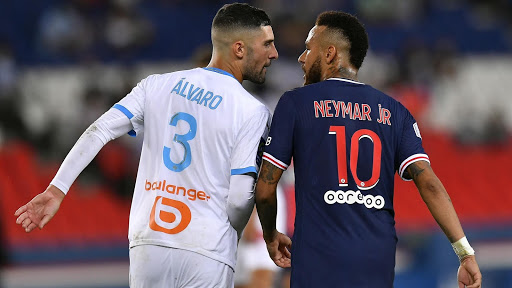Racism in European Soccer

In a fiery match between French rivals Paris Saint-Germain and Olympique de Marseille, allegations arose of Marseille player Alvaro Gonzalez using racist remarks towards PSG’s Neymar Jr.
December 18, 2020
Players from all seven continents have quickly flooded into the European football (soccer) force. American international Weston McKennie, Brazilian sensation Neymar Jr., Korean superstar Son Heung-min, and Egyptian wonder Mohamed Salah are only a few names on a long list of foreign players hitting their stride in Europe. Yet, even after conquering the difficulties of moving to a new continent, there still remains unrest in the waves of the stadium for many players of color as racism in professional soccer continues to sear across the nations.
On December 8th, most recently, an incident surrounding racism surged out of a Champions League match between French giants, Paris Saint-Germain, and Turkish powerhouse Basaksehir, where it was alleged that the Romanian fourth official had used a racist term to describe Basaksehir’s black assistant coach, Pierre Webo. Famous still, a Euro Cup qualifying match between Bulgaria and England in 2019 saw many black English players subject to racist abuse from Bulgarian spectators in the stands. Further, in 2019, Romelu Lukaku, a Belgian international of Jamaican descent, was subject to racist monkey chants around the stadium while he took position to take a penalty in his second game for Internazionale after his move to Italy. Racism in football affects both big and small teams; yet, what are the top footballing officials and biggest teams in Europe doing to kick out racism?
The English Premier League, after the Black Lives Matter Movement instigated by the death of George Floyd, changed the players’ names on the backs of the jerseys to ‘Black Lives Matter’ for an extensive period of time to raise awareness about the global push to fight racism. Joy Zhou (11) agrees with this approach. “I think it’s important to spread awareness about it,” she says. The league had also released a statement crafted by players from each of the twenty teams declaring a united stand against racism in sports, as well as pledging to support players attempting to take a knee in protest before games.
Organizations have also played a role in tackling racism in soccer. The UK anti-racism organization, Kick It Out, publishes reports evaluating the progress in eliminating racism and homophobia in professional and grassroots sports and discusses these issues in the media. The Professional Footballers’ Association, as well, serves to protect the working conditions of both professional male and female soccer players, involving itself in issues of racism in soccer.
Ultimately, the sport has no bounds, ranking internationally as the number one played worldwide. The highest stages of Europe, as a result, and for ages to come, will certainly not see a shortage of talented young players hailing from all corners of the world, bringing with them diversity and unique flavors of European football.




































